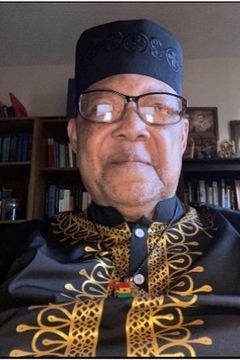Dia Mari-Jata

Chaplain
Dr. Dia Sekou Mari-Jata (EdD, DMin, MDiv, MATh, MA, BA) began teaching at the undergraduate college level in 1997 part-time until retiring from the U. S. Treasury Department as a Revenue Field Officer in 2006. Upon retirement from the federal government Dr. Mari-Jata took on more teaching assignments as an Adjunct Professor at Cincinnati State Technical & Community College, Sinclair Community College (Dayton, Ohio), and Union Institute & University (Cincinnati, Ohio), where he taught courses in history and religion, philosophy, moral and social ethics, and critical thinking, including courses in African history. He says: “Out of all my experiences as a college teacher, the most eventful and fulfilling was having students from high school take some of my courses as part of Sinclair Community College’s extension program. I never forgot the enthusiasm and joy of learning new things these high schoolers expressed.” Years later, after retirement from college teaching in 2013, this memory inspired Dr. Mari-Jata to apply for the Ohio Department of Education’s four-year Alternative Resident Educator License Program, which after completion will allow him to teach Integrated Social Studies (K12) in the State of Ohio.
While accepting this educational challenge Dr. Mari-Jata knew that something in this educator secondary program would be missing. What would be missed is a focus on courses and learning about Africa, and the opportunity to teach about Africa in any meaningful way at the secondary school level. Dr. Mari-Jata’s interest in African studies has always been strong since undergraduate school at Xavier University where his Political Science Senior Theses was on “The Nigerian Civil War” (i.e., the 1967-1970 Nigerian-Biafran War). He argued that the artificial African borders created by the so-called “Scramble for Africa” or the “Partition of Africa,” planned by European nations at the Berlin Conference of 1884, was the root cause of this civil war, causing ethno-religious violence (in this case anti-Igbo pogroms in Northern Nigeria) between groups fighting over control of precious resources such as oil (in this case control over the lucrative oil production in the Niger Delta). By the time Dr. Mari-Jata took his Master of Arts in History, he delved deeper in African research and presented the Xavier University Graduate School with a Master’s Thesis entitled “Sino-African Relations 1949-1983: A Study of Chinese Foreign Policy and Relations with Selected African States” (1985). Without knowing it then, Dr. Mari-Jata anticipated the overwhelming economic and political footprint that China has today in Africa, especially in the African nation of Ghana that he (as a Hospital Chaplain) visited in December 2021 as part of the ADDI Business Expo, assigned to the Medical Sector Team that provided medicines to the Cape Coast Teaching Hospital.
Dr. Mari-Jata examined that many school and academic textbooks on world history come up short when it comes to conveying more than a passing knowledge of Africa. The question for Dr. Mari-Jata is: How does he create an empathetic space to teach and research on what he knows about Africa? This is where, fortunately for him, the Boston University Teaching Africa Teacher Certificate (TAT) Program comes in. Mari-Jata believes the TAT program not only holds promise to allow him to dive deeper into African Studies research but help him build informative and exciting curricula and courses that will inspire students and help build in them a passion for African Studies in various areas and fields of knowledge.